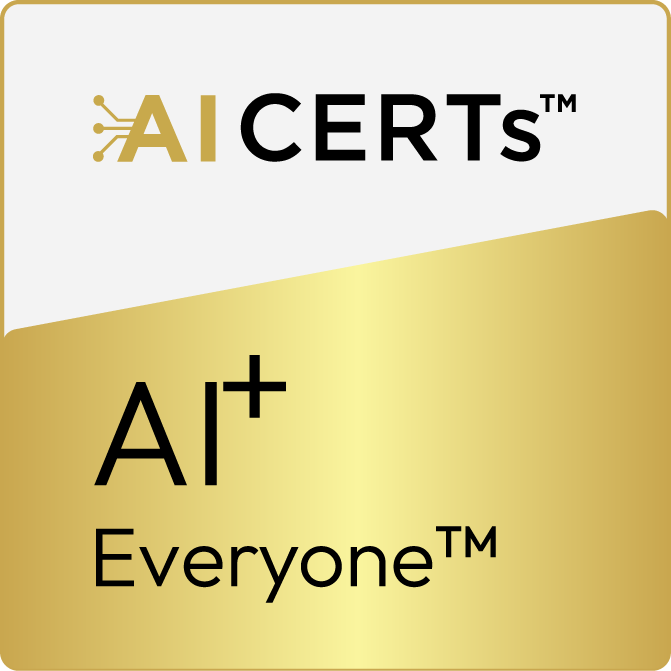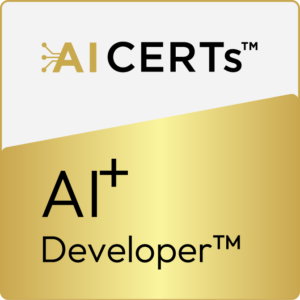Description
AI+ Everyone (1 Day)
Program Detailed Curriculum
Executive Summary
The AI+ Everyone course offers a comprehensive journey through the landscape of artificial intelligence,
covering fundamental principles, technological advancements, real-world applications, project workflows,
ethical considerations, generative AI, and preparation for an AI-driven future. Participants gain insights
into diverse AI technologies and their practical implications across industries, alongside discussions on
ethics and societal impact. The course culminates with practical guidance for starting with AI, providing
resources for further exploration. Overall, participants are equipped with a holistic understanding of AI,
empowering them to navigate its opportunities and challenges in today’s rapidly evolving technological
landscape
Course Prerequisites
Understand the basics of digital technologies and how they affect life
Awareness of ethical principles and societal impact of technology
Curiosity and openness to learning about new concepts and technologies
Module 1
Introduction to Artificial Intelligence
1.1 What is Artificial Intelligence?
Defining AI: The Science and Engineering of Making Intelligent Machines: Explore AI fundamentals, from machine
learning to ethics. Understand how intelligent machines are designed and implemented in diverse applications.
Dive deep into AI’s essence.
The Spectrum of AI: Narrow AI vs. General AI: Differentiate between Narrow AI, designed for specific tasks, and
General AI, which possesses broader cognitive capabilities, in an exploration of AI’s spectrum.
Examples of AI in Everyday Life: Explore practical AI applications from virtual assistants to recommendation
systems, revealing how they streamline daily tasks and enhance experiences in diverse contexts.
1.2 A Brief History of AI
The Inception of AI: Key Figures and Milestones: Delve into AI’s origins, tracing milestones and key figures from its
inception to modern breakthroughs, gaining insights into its transformative journey.
Evolution Over the Decades: From Turing Test to Neural Networks: Trace the journey of artificial intelligence from
Turing’s test to contemporary neural networks, examining key developments and their impact over the years.
The AI Winter and its Thaw: Resurgence of AI in the 21st Century: Explore the rise, fall, and revival of AI through the
lens of the AI Winter, analyzing its impact and the 21st-century resurgence.
1.3 Demystifying AI: Myths vs. Reality
Common Misconceptions About AI: Uncover and debunk prevalent myths surrounding artificial intelligence,
exploring its capabilities, limitations, and societal implications.
Separating AI Fiction from AI Fact: Distinguish between exaggerated portrayals and real capabilities of AI. Analyze
myths, misconceptions, and ethical implications, fostering informed perspectives.
Understanding AI’s Capabilities and Limitations: Explore AI’s capabilities and limitations, covering machine
learning, neural networks, and ethical considerations to comprehend its potential impact and challenges.
1.4 The Significance of AI in Everyday Life
AI in Consumer Technology: Smartphones, Smart Homes, and Personal Assistants: Delve into AI’s role in
transforming consumer tech: smartphones, smart homes, and personal assistants. Analyze innovations, user-centric
design, and market implications.
AI in the Workplace: Automation, Productivity, and Job Creation: Discover AI’s transformative role in workplaces,
covering automation’s impact on productivity, job creation, and the evolving dynamics of modern employment.
The Societal Impact of AI: Healthcare, Education, and Beyond: Uncover AI’s societal impact in healthcare,
education, and beyond. Explore ethical implications and future directions.
Module 2
AI Technologies
2.1 Machine Learning: Basics and Beyond
Understanding Machine Learning Algorithms: Supervised vs. Unsupervised Learning: Explore supervised and
unsupervised learning in machine learning algorithms. Understand how data-driven models are trained and applied
for various tasks.
Real-world Applications of Machine Learning: Discover how machine learning drives innovation across industries.
Gain hands-on experience applying algorithms to solve real-world challenges efficiently and effectively.
Tools and Platforms for Machine Learning Development: Unlock the power of machine learning with essential
tools and platforms, mastering frameworks, libraries, and cloud services for seamless development workflows.
2.2 Deep Learning and Neural Networks
The Architecture of Neural Networks: Neurons, Layers, and Activation Functions: Delve into the intricate design of
neural networks, unraveling the significance of neurons, layers, and activation functions in shaping network
architecture.
Introduction to Deep Learning: Convolutional Neural Networks (CNNs), Recurrent Neural Networks (RNNs), and
Transformers: Discover the fundamentals of CNNs, RNNs, and Transformers in deep learning. Learn their structure,
training techniques, and real-world applications.
Case Studies: Image Recognition, Natural Language Processing, and More: Explore case studies in Image
Recognition, Natural Language Processing, and more to understand applications and challenges in cutting-edge AI
technologies.
2.3 AI Technologies in Action: Simplified Examples
Demonstrating How AI Powers Everyday Applications: Recommendations Systems, Voice Recognition, etc…:
Discover the practical applications of AI in everyday life, from recommendation systems to voice recognition, and
unlock their impact on modern society.
The Role of Data in Training AI Models: Learn the significance of data in AI model training, from collection to
preprocessing, to enhance understanding of its impact on model accuracy and performance.
Limitations and Challenges of Current AI Technologies: Survey the obstacles hindering present AI advancements,
dissecting issues like data biases, interpretability, scalability, and ethical dilemmas critical for future innovation.
2.4 Interactive Workshop: Exploring AI
Hands-on Activity Using a Simple AI Tool or Platform (e.g., TensorFlow Playground): Experience practical AI
application with TensorFlow Playground. Learn hands-on techniques for data analysis, model training, and
experimentation in a user-friendly environment.
Participants Experiment with Changing Parameters in a Pre-built Model to Observe Outcomes: Explore altering
parameters within a pre-made model to analyze resulting effects, facilitating deeper understanding through hands-
on experimentation and observation.
Module 3
AI in Action: Applications and Case Studies
3.1 Introduction to AI Applications
The Scope of AI Across Different Sectors: Explore AI’s wide-ranging impact across industries. Analyze applications
in healthcare, finance, transportation, and more, uncovering opportunities and challenges in each sector.
How AI is Revolutionizing Industries?: Unlock the power of AI in diverse sectors. Learn about breakthrough
applications, challenges, and opportunities reshaping industries worldwide.
Introduction to the Case Study Method: Learn to analyze real-world scenarios, develop problem-solving skills, and
gain insights into decision-making processes.
3.2 Case Study 1: Smart Speakers
Technology Behind Smart Speakers: Voice Recognition and Natural Language Processing: Uncover the underlying
mechanisms driving smart speakers, focusing on voice recognition and natural language processing to grasp their
innovative capabilities.
Impact on Consumer Behavior and Industry Standards: Explore how smart speakers revolutionize consumer
habits and industry norms, examining their influence on purchasing decisions and evolving market standards.
The Future of Voice-Activated Technology: Discover the cutting-edge developments and far-reaching implications
of voice-activated technology in this forward-looking course on the future of interaction.
3.3 Case Study 2: Self-Driving Cars
Overview of Autonomous Vehicle Technology: Sensors, Data, and AI decision-making: Explore sensors, data
processing, and AI decision-making in autonomous vehicles. Learn key technologies driving the future of
transportation.
Ethical and Safety Considerations: Examine the ethical complexities and safety protocols surrounding autonomous
vehicles, addressing societal implications, algorithmic decision-making, and evolving regulatory standards.
The Road Ahead: Challenges and Opportunities for Self-driving Cars: Discover the complexities of self-driving
cars, analyzing hurdles and potential advancements. Navigate the future of autonomous vehicles with critical
understanding and foresight.
3.4 Case Study 3: Healthcare Applications
AI in Diagnostics, Treatment Planning, and Patient Monitoring: Explore AI’s pivotal role in healthcare: diagnosing
ailments, devising treatment strategies, and enhancing patient care through advanced monitoring technologies.
Case Studies: AI-driven Diagnostic Tools, Personalized Medicine: Delve into AI’s impact on diagnostic tools and
personalized medicine through real-world cases. Discover how algorithms revolutionize healthcare for tailored
patient treatments.
Ethical Implications: Patient privacy and AI Decision-making in Healthcare: Examine ethical dilemmas arising
from AI-driven healthcare decisions, emphasizing patient privacy. Understand strategies to uphold ethical standards
in evolving healthcare landscapes.
Module 4
The Workflow of AI Projects
4.1 Introduction to AI Project Workflow
Overview of the AI Project Lifecycle: Discover the project development lifecycle from inception to execution. Learn
problem scoping, data handling, model creation, assessment, and deployment best practices for success.
Key Phases and Milestones in AI Project Development: Explore key phases and milestones in AI project
development, covering ideation, data collection, model training, evaluation, deployment, and ongoing optimization
strategies.
Importance of Defining Clear Objectives and Outcomes: Learn to set precise objectives and outcomes crucial for
successful AI project development, ensuring alignment with stakeholder expectations and project success.
4.2 Problem Definition and Data Preparation
Identifying and Defining the AI Problem: Learn to pinpoint AI challenges through problem identification and
definition, crucial for effective solutions in diverse fields.
Data Collection Strategies: Sources, Quality, and Bias Considerations: Explore diverse data collection methods,
assessing sources, quality, and biases. Gain insights into effective strategies for robust, unbiased data gathering.
Data Cleaning and Preprocessing Techniques: Master data cleaning and preprocessing techniques like handle
missing values, outliers, and inconsistencies to prepare high-quality datasets for analysis and machine learning.
4.3 Model Selection, Training, and Validation
Training the Model: Techniques, Tools, and Best Practices: Unlock the secrets of AI model training with
comprehensive techniques, essential tools, and industry-best practices for unparalleled performance and
innovation.
Validating the Model: Performance Metrics and Validation Strategies: Learn essential AI model validation
techniques, including performance metrics selection and validation strategies, ensuring accuracy and reliability in
machine learning outcomes.
4.4 Deployment and Integration
Deploying AI Models into Production Environments: Learn to deploy AI models effectively, covering deployment
strategies, model versioning, monitoring, scaling, and integration with production environments for seamless
functionality.
Integration with Existing Systems and Processes: Learn to seamlessly incorporate AI models into existing systems
and workflows, optimizing efficiency and effectiveness through practical integration strategies and implementation
techniques.
Monitoring and Maintenance of AI Systems: Learn essential techniques for monitoring and maintaining AI
systems, ensuring optimal performance and reliability throughout their lifecycle. Practical insights for AI
practitioners.
4.5 Evaluation and Iteration
Methods for Evaluating AI Project Success and Impact: Explore metrics, frameworks, and methodologies crucial
for assessing the success and societal impact of AI projects. Practical insights for effective evaluation.
Continuous Improvement: Iterating on the Model Based on Feedback and Performance: Refine models through
feedback and performance metrics for continuous improvement, fostering iterative enhancements in a dynamic
learning environment.
Case Studies: A Real-world Examples of an AI Project: Dive into AI project realities with diverse case studies. Uncover
strategies, pitfalls, and solutions for successful implementation in real-world scenarios. Practical insights abound.
Module 5
Ethics and Social Implications of AI
5.1 Introduction to AI Ethics and Social Implications
The Importance of Ethics in AI Development and Application: Explore ethical considerations shaping AI’s
development and application, addressing accountability, bias mitigation, and societal impacts crucial for responsible
technological advancement.
Overview of Common Ethical Concerns and Social Implications: Analyze ethical quandaries and societal
repercussions prevalent in contemporary contexts, equipping learners with discernment and ethical frameworks for
navigating complex issues.
The Role of AI Ethics in Guiding Technology towards Positive Societal Impact: Discover the pivotal role of AI
ethics in steering technology towards beneficial societal outcomes. Delve into ethical frameworks and practices for
impactful innovation.
5.2 Bias and Fairness in AI
Understanding Bias in AI: Types and Sources of Bias: Delve into AI bias: origins, impacts, and solutions. Recognize
societal, data, and algorithmic biases. Equip yourself to create fairer AI systems.
Case Studies Illustrating the Consequences of Biased AI Systems: Analyze diverse case studies showcasing the
ramifications of biased AI systems, emphasizing societal implications, ethical dilemmas, and strategies for
remediation and equitable implementation.
Strategies for Mitigating Bias and Ensuring Fairness in AI Models: “Learn effective strategies to detect, mitigate,
and prevent bias in AI models, fostering fairness and inclusivity in algorithmic decision-making processes.
5.3 Privacy and Security in the Age of AI
AI’s Impact on Personal Privacy and Data Security: Explore the intersection of AI, personal privacy, and data
security. Understand risks, safeguards, and ethical considerations in harnessing AI while protecting privacy.
Privacy-enhancing Technologies and Practices in AI: Discover privacy-preserving methods in AI, delving into
encryption, differential privacy, and ethical data practices, ensuring confidentiality and integrity in AI systems.
Legal and Regulatory Considerations for AI Privacy and Security: Examine the intersection of AI, privacy, and
security laws, navigating compliance challenges and strategizing for ethical and lawful AI implementation.
5.4 Responsible AI Development
Principles of Responsible AI: Transparency, Accountability, and Ethical Use: Explore key concepts in Responsible
AI: Transparency, Accountability, and Ethical Use. Learn to navigate ethical dilemmas and foster trust in AI systems.
Incorporating Ethical Considerations into the AI Development Lifecycle: Learn to embed ethical principles into
every stage of AI development, ensuring responsible decision-making and mitigating potential harms effectively.
Industry Standards and Guidelines for Ethical AI: Understand key industry standards and guidelines governing the
ethical use of AI, covering principles, regulations, and best practices for responsible AI development
5.5 AI and Society: Looking Ahead
The Societal Impact of AI: Job Transformation, Social Dynamics, and Governance: Delve into AI’s societal
ramifications: job evolution, shifts in social dynamics, and governance challenges. Navigate the complexities of AI’s
impact.
Preparing for an AI-driven Future: Education, Policy, and Public Engagement: Master strategies in education,
policy, and public engagement to thrive in an AI-centric world. Navigate the evolving landscape with confidence and
innovation.
Ethical Considerations in Emerging AI Technologies (e.g., Generative AI, Autonomous Systems): Explore ethical
dilemmas in emerging AI like Generative AI and Autonomous Systems, analyzing their societal impact and
developing responsible frameworks.
Module 6
Generative AI and Creativity
6.1 Introduction to Generative AI
Defining Generative AI and its Distinction from Other AI Technologies: Learn the fundamentals of Generative AI,
distinguishing it from other AI technologies, exploring its creative potential and applications in various domains.
Overview of Generative AI Models (e.g., GANs, VAEs, Transformer Models): Discover the power of Generative AI,
including GANs, VAEs, and Transformers. Understand their workings, applications, and practical implementation.
The Role of Generative AI in Creativity and Innovation: Uncover the pivotal role Generative AI plays in sparking
creativity and revolutionizing innovation across industries.
6.2 Applications of Generative AI in Creativity
Case studies of Generative AI in Art, Music, Writing, and Design: Explore how Generative AI transforms creative
fields through case studies in art, music, writing, and design, revealing its impact and potential.
Demonstrating Tools and Platforms that Leverage Generative AI for Creative Purposes: Discover diverse
generative AI tools empowering creativity in art, music, and design. Experiment, innovate, and transform ideas into
captivating expressions.
The Creative Process Augmented by AI: Collaboration Between Humans and Machines: Explore symbiotic
relationships between humans and AI in creative endeavors, discovering innovative ways AI augments the creative
process through collaboration and synergy.
6.3 Ethical Considerations in Generative AI
Intellectual Property Rights and Authorship in AI-generated Content: Explore the legal landscape of AI-
generated content, covering intellectual property rights, authorship attribution, and ethical considerations.
Ethical Use of Data in Training Generative Models: Navigate through the ethical landscape of training generative
models, addressing biases, privacy concerns, and societal impacts while fostering responsible data practices.
The Impact of Generative AI on Creative Industries and Employment: Examine generative AI’s influence on
creative fields and job dynamics, navigating its implications for innovation, productivity, and workforce adaptation.
6.4 Exploring the Future of Creativity with AI
Emerging Trends and Future Possibilities in Generative AI: Explore cutting-edge developments and potential
advancements in Generative AI, examining emerging trends and envisioning future possibilities in this rapidly
evolving field.
Potential Societal and Cultural Impacts of AI-driven Creativity: Uncover the societal and cultural implications of
AI-powered creativity, examining its transformative potential and ethical considerations in shaping our collective
future.
Fostering a Responsible Approach to the Development and Use of Creative AI Technologies: Navigate through
the ethical landscape of creative AI, fostering conscientious development and utilization for societal benefit and
ethical advancement.
Module 7
Preparing for an AI-Driven Future
7.1 The Future Landscape of AI
Predictions for AI’s Impact on Society in the Next Decade: Discover AI’s societal impact over the next decade.
Analyze trends, ethical dilemmas, and potential disruptions across sectors. Prepare for the AI-driven future.
AI’s Role in Addressing Global Challenges: Unlock AI’s potential in confronting global issues such as sustainability,
healthcare disparities, and social inequality, emphasizing ethical frameworks and transformative solutions.
7.2 AI and the Transformation of Work
How AI is Reshaping Industries and the Nature of Work: Explore AI’s transformative impact on industries and
work dynamics. Discover how automation, data analysis, and machine learning revolutionize businesses and
reshape employment landscapes.
Job Displacement vs. Job Creation: The Dual Impact of AI Examine AI’s impact on job displacement and creation,
assessing its dual effects on employment trends and the evolving workforce landscape.
Skills of the Future: Identifying and Developing AI-relevant Competencies: Unlock the future with AI
competencies. Sharpen your skills to navigate the AI-driven world ahead. Identify, nurture, and thrive with AI.
7.3 Lifelong Learning in an AI World
The Importance of Continuous Education and Skill Development: Stay ahead in AI with continuous education.
Enhance skills vital for innovation and competitiveness. Explore evolving trends and technologies for sustainable
growth.
Resources for AI learning: Courses, Certifications, and Platforms: Discover comprehensive AI learning resources,
including courses, certifications, and platforms, to advance skills and knowledge in artificial intelligence efficiently
and effectively.
Building a Personal Learning Plan for AI Literacy and Expertise: Craft your personalized AI learning journey with
essential foundations, advanced concepts, and practical applications to foster expertise in artificial intelligence.
7.4 Staying Relevant in an AI-Driven World
Strategies for Individuals and Organizations to Leverage AI for Growth: Explore practical approaches for
maximizing AI’s potential in personal and professional contexts.
Navigating Ethical Considerations and Societal Impacts in AI Adoption: Delve into the complexities of ethical
decision-making and societal implications in AI integration.
Case studies: Successful Adaptation and Innovation in the AI Era: Analyze real-world examples to elucidate
effective strategies for thriving amidst technological evolution.
7.5 Interactive Discussion: Preparing for the Future with AI
Participants Share their Thoughts on How AI May Impact their Lives and Careers: Engage in dialogue exploring
AI’s influence on personal and professional realms, fostering readiness through insightful discussions on potential
implications.
Discussion on Personal and Professional Strategies for AI Readiness: Delve into crafting effective personal and
professional strategies, empowering individuals to navigate and thrive in AI-driven landscapes.
Module 8
Starting with AI: First Steps and Resources
8.1 Introduction to Starting with AI
The Importance of a Strategic Approach to AI Adoption: Understand strategic AI adoption for competitive
advantage, covering planning, implementation, and optimization strategies for organizational success in the digital
era.
Overview of the AI Ecosystem: Key Players, Platforms, and Technologies: Explore the AI landscape, from major
players to emerging technologies, gaining insights into platforms shaping innovation and future trends.
Assessing your AI Readiness: Personal or Organizational: Evaluate personal or organizational readiness for AI
integration, covering assessments, challenges, and strategies to maximize AI’s transformative potential.
8.2 Choosing AI Projects
Identifying Opportunities for AI in Your Context: Explore techniques to spot AI applications tailored to your
environment, enhancing innovation and efficiency.
Criteria for Selecting Promising AI Projects: Equip yourself with essential guidelines to assess and choose AI
endeavors strategically and effectively.
Setting Realistic Goals and Expectations for AI Initiatives: Learn practical strategies to define achievable
objectives and manage expectations for successful AI implementation.
8.3 Forming AI Teams
Key Roles and Skills Needed for AI Projects: Learn essential roles and skills crucial for successful AI projects,
including data science, engineering, project management, and domain expertise.
Building vs. Buying AI Capabilities: Considerations and Strategies: Analyze trade-offs between developing in-
house AI versus purchasing solutions, considering costs, expertise, customization, and strategic alignment.
Fostering a Culture of AI Innovation and Learning: Cultivate an organizational environment supportive of AI
experimentation, continuous learning, collaboration, and risk-taking to drive innovation and sustainable growth.
8.4 Resources for Learning and Development in AI
Overview of Learning Platforms and Courses for AI Education: Explore AI education platforms, courses, and
resources for comprehensive learning in artificial intelligence, tailored for diverse skill levels and interests.
Community and Networking Opportunities in the AI Field: Discover networking avenues and community
engagement strategies within the dynamic AI landscape, fostering collaborations, knowledge sharing, and
professional growth.
Grants, Funding, and Support for AI Projects and Research: Unlock opportunities for financial support, grants, and
resources to propel AI projects and research initiatives, facilitating innovation and impact in the field.
AI+ Everyone Detailed Curriculum
Date Issued: 20/01/2024
Version: 1.1







Reviews
There are no reviews yet.